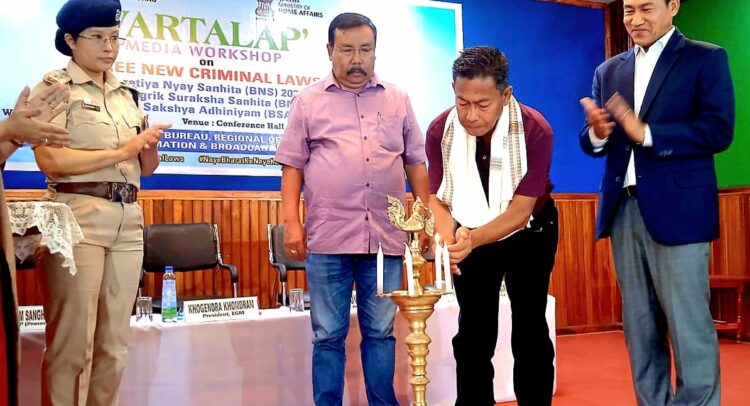Asem Bhakta, Special Correspondent North East
Imphal: The Press Information Bureau (PIB) Imphal Regional Office, under the Ministry of Information and Broadcasting, Government of India, organized a one-day media workshop titled “Vartalap (Media Workshop)” on “Three New Criminal Laws” today at the Manipur Press Club, Imphal. The event aimed to raise awareness among journalists about the new laws.
The three new criminal laws – Bharatiya Nyaya Sanhita (BNS), Bharatiya Nagrik Suraksha Sanhita (BNSS), and Bharatiya Sakshya Adhiniyam (BSA) – which took effect on 1st July 2024, have replaced the colonial-era Indian Penal Code (IPC), Code of Criminal Procedure (CrPC), and Indian Evidence Act.
Around 50 journalists from various media houses in Imphal and other districts of Manipur attended the workshop. SP (Prosecution) Manipur, Haobam Sanghamita, MPS, served as a resource person and spoke about the new laws.
The workshop’s inaugural session featured special guests Khogendro Khondram, President of Editors’ Guild Manipur, and Bijoy Kakchingtabam, President of All Manipur Working Journalists’ Union (AMWJU).
As a resource person, SP (Prosecution) Manipur Haobam Sanghamita emphasized that the new laws represent a justice-focused approach, incorporating technological advancements in police investigations and court procedures. She highlighted that the new laws include offenses like terrorism, mob lynching, and organized , and introduce enhanced punishments for crimes against women and children.
For now, police officers are instructed to invoke related sections under the BNS, such as wrongful confinement and physical harm, if they receive such complaints until an amendment addresses this anomaly. The IPC and CrPC will continue to run concurrently with the new laws, as several cases are still pending in courts and crimes committed before 1st July 2024 that are reported later will need to be registered under the IPC, she explained.
She also mentioned that First Information Reports (FIRs) can now be filed online through the Crime and Criminal Tracking Network Systems (CCTNS), allowing for e-FIRs and zero FIRs in multiple languages without requiring a visit to a police station.
The BNS introduces new legal provisions, including Clause 69, which criminalizes sexual intercourse under “deceitful means.” This provision targets individuals who engage in sexual relations through deceit, such as false promises of employment or marriage without the intention to fulfill them, with penalties of up to 10 years of imprisonment and fines.
A significant change under Clause 187(3) of the BNSS is the extension of police custody from 15 days under the CrPC to up to 90 days. This aims to expedite trials and adopt a victim-centric approach, though critics express concerns about potential misuse and its impact on custodial rights.
The BNSS also introduces community service as an alternative to imprisonment for minor offenses like theft or defamation, aiming to reduce prison overcrowding. However, the law lacks a clear definition of community service, leaving its implementation at judges’ discretion.
The inclusion of marital rape of minor wives under rape laws addresses a longstanding gap, aligning with Supreme Court directives and acknowledging discrepancies in IPC provisions.
In his welcome address, Dr. Engam Pame, IIS, Director of PIB Imphal, emphasized the media’s role in raising public awareness about the three new criminal laws effective from 1st July 2024. He stated that the success of any government policy or program depends on active public participation and support. The workshop aimed to create an interface among government partners, stakeholders, and media personnel.
Special guests Khogendro Khondram and Bijoy Kakchingtabam underscored the importance of sensitizing media personnel on the new criminal laws to ensure accurate dissemination of information to the public. Kakchingtabam praised the government’s effort in creating awareness of the new laws among journalists.
Pushpa Maibam of IA PIB Imphal expressed gratitude to the dignitaries, resource persons, and journalists who attended the workshop.


